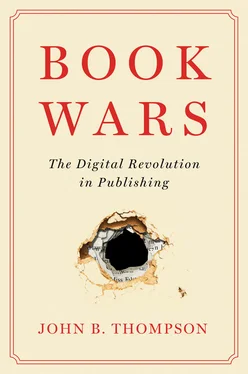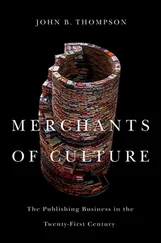But will it turn out like that in the end – a revolution in format but not in form? There are two reasons why we can’t yet give a firm answer to this question, and one reason why the picture we’ve painted so far is incomplete at best. The first reason is that the stability of the current sales patterns, and in particular the levelling off of ebook sales relative to print sales, is dependent on the continuation of the current retail environment, which, despite the bankruptcy of Borders in 2011 and the closing of many Barnes & Noble stores, is still characterized by the existence of many bricks-and-mortar bookstores, both chain and independent. While Amazon has become the single largest customer for many trade publishers, the continued existence of a multiplicity of bookstores provides a vital shop window for publishers’ books – and that means, of course, their print books, which continue to get retail exposure thanks to the display space and shelf space of bookstores. Were this retail environment to change significantly in the coming years – were, for example, Barnes & Noble or Waterstones to scale back dramatically or even close down, or were bookstores forced to close for other reasons – then this could have a significant impact on the sales of physical books. We simply don’t know what would happen in that case to the relation between physical book sales and ebook sales, and how the different categories of book would be affected by this change. The second reason why we can’t give a firm answer to this question is that we simply don’t know what the future holds in store. On the basis of the evidence so far, there is a good prima facie case for saying that ebooks are best understood as another format rather than a new form of book, but only the future will tell whether this judgement holds in the long run.
The picture we’ve painted so far is, however, incomplete in one very important way: we’ve been relying on data from one large trade publisher, and, given the centrality of this publisher and the nature of their list, it is reasonable to assume that their experience will be similar to that of other large trade publishers. But the book market is populated not just with the output of large trade publishers: it is also populated with the output of many small and medium-sized publishers and, crucially, with the output of many self-publishers and many authors using self-publishing platforms of various kinds, from Amazon’s Kindle Direct Publishing (KDP) to a plethora of other platforms (we’ll examine these in more detail in chapter 7). The experiences of many small and medium-sized publishers may not differ greatly from the experience of large trade publishers like Olympic, but the world of self-publishing is another matter entirely. Many of the self-publishing platforms, including Kindle Direct, are publishing in ebook only, 13and some self-published ebooks have become bestsellers. 14So the patterns in the world of self-publishing are likely to look quite different from the patterns of the large trade publishers who are publishing in print and ebook formats, and for whom print remains a key revenue stream. They are also likely to differ from the patterns that appear in the data supplied by professional organizations like the Association of American Publishers (AAP), since these data are drawn from traditional publishers and therefore don’t take account of self-publishing. So there is likely to be a substantial body of material, a high proportion of which is being published as ebooks, that is not being factored into these calculations about the patterns of ebook sales. How big a body of material? Nobody knows. We can try to estimate its size – we’ll return to this in chapter 7– but any estimate is going to be a very rough guess. What we can say with some confidence is that it’s not small. Self-publishing is the submerged continent that could, if we were ever to know its true extent, put all of our calculations so far in a very different light.
There is one other reason why this point is important: in the wake of the Department of Justice case against Apple and five of the large trade publishers in 2012 (see chapter 5below), these publishers were obliged to adopt for two years a modified version of the agency agreement that allowed retailers to discount ebooks to some extent. When this requirement expired in 2014, all the large trade publishers moved to full agency agreements, which meant that they set the prices of ebooks within agreed bands and retailers were no longer allowed to discount. This meant that new ebooks from the large trade publishers were – especially from 2014 on – typically selling at much higher prices than self-published ebooks. The difference might be as much as $13–$14 for the ebook of a newly released title from a large trade house compared to $3.99, $2.99 or less for a new ebook from a self-published author. And when you take account of the fact that a large proportion of books self-published on Kindle can be accessed for no charge by joining Kindle Unlimited for $9.99 per month (with a 30-day free trial), the cost per unit read of books self-published on Kindle becomes a small fraction of the cost per read of ebooks published by traditional publishers. Of course, there is the question of whether you want to read that material, however inexpensive it may be. But the fact that the price differential is now so great is likely to have the effect of driving down ebook sales from traditional publishers while self-published ebooks take a larger and larger share of the ebook cake, however large (or small) that cake may be.
We simply don’t know at this stage how the overall picture of ebook sales relative to total book sales, in both units and dollars, would change if we were able to take account of all books published and sold in the US in any particular year, including self-published books, and how the picture would vary by category of book. We might still see a plateau effect, though the levels at which ebooks begin to plateau might be quite a lot higher, especially in certain book categories, such as romance and mystery, which are popular in the world of self-publishing. Indeed, it could be that some of the decline we see in traditional publishers’ ebook sales in certain categories, like romance and mystery, attests not to an overall decline in ebook sales but rather to a revenue flight from traditional publishers to self-publishers, as readers migrate from higher-priced ebooks published by traditional publishers to much cheaper ebooks self-published through Kindle and through other self-publishing platforms. We’ll return to these questions in due course.
So far we’ve been looking at the patterns of ebook sales for trade publishing in the US, but the US case is somewhat exceptional: the uptake of ebook sales to date has been much stronger there than elsewhere. Among the markets outside of North America, the ebook sales patterns for the UK bear the closest resemblance to the US. This is not altogether surprising: the UK and US book markets share many similarities, the big trade publishers in both markets belong to the same large conglomerates, and Amazon is a major retailer in both the UK and the US. There was a time lag, however: ebook sales were minimal in the UK prior to 2010, and they only began to increase significantly from 2011 on. This delay can be partly explained by the fact that Amazon did not launch the Kindle in the UK until August 2010, almost three years after it had been released in the US. Both the Sony Reader and the iPad were already available in the UK by that time (the Sony Reader was launched in the UK in September 2008 and the iPad in May 2010), but the surge in ebook sales in the UK occurred only after the Kindle had been introduced.
So does this mean that the UK pattern of ebook sales is simply lagging behind the US pattern by a year or two and will eventually catch up? There were many who thought this, but the evidence doesn’t entirely support this thesis. Table 1.8and figures 1.12a, 1.12band 1.12c, based on data from Nielsen and the Publishers Association, show ebook sales as a percentage of total consumer book sales in the UK from 2008 to 2018. 15These figures show that the ebook surge in the UK followed a pattern that was very similar to the US: ebook sales rose quickly following the introduction of the Kindle in August 2010, jumping from £22 million in 2010 to £106 million in 2011 and £250 million in 2012, a growth rate of around 375% in 2011 and around 135% in 2012. Growth then quickly slowed down and ebook sales peaked at £312 million in 2014, after which they fell back, declining by 4% in 2015 and 7% in 2016 and 2017. As a percentage of total consumer book sales, ebooks accounted for 6.3% of total sales in the UK in 2011; this jumped to 13.5% in 2012 and then continued to rise until it reached 18.3% in 2014, after which it fell back to around 13% in 2017 and 2018. So, while the pattern is broadly similar to the US – an initial surge leading to a plateau and then a modest decline – there are two significant differences. First, there is the time lag: the take-off and plateauing in the UK were a year or two behind the US. In the US, ebooks took off in 2009–10 and reached their peak in 2012, where they remained until 2014, after which they began to decline; in the UK, ebooks took off in 2010–11 and peaked in 2014, after which they began to decline. The second difference is that, when ebook sales began to plateau, they did so at a lower level in the UK – they never reached the same high points that you see in the US. The UK figure plateaued at 18.3% in 2014 and then fell back to around 13% in 2017–18: this is well below the high point reached in the US, where ebook sales plateaued at 24.1% in 2014 before falling back to around 15% in 2017 and 2018.
Читать дальше












